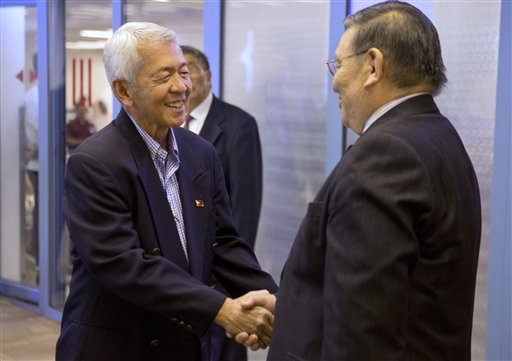
Philippine Foreign Affairs Secretary Perfecto Yasay Jr., left, shakes hands with Mongolia’s past vice minister of foreign affairs Choinkhor, right, as he arrives at Chinggis Khaan International Airport ahead of the ASEM summit in Ulaanbaatar, Mongolia Thursday, July 14, 2016. AP PHOTO
ULAN BATOR, Mongolia—Beijing faces an international dressing down Friday at a gathering of leaders from across Asia and Europe after it vehemently rejected a UN-backed tribunal’s dismissal of its extensive South China Sea claims.
The biennial Asia-Europe Meeting (Asem), which is celebrating its 20th anniversary, is supposed to be a venue for increasing cooperation across the Eurasian continent and exploring ways to strengthen the global system of agreements that govern everything from trade to civil aviation.
But this year’s gathering in Mongolia is the first major international conference since the Permanent Court of Arbitration (PCA) in The Hague ruled that Beijing’s claims to much of the strategically vital South China Sea have no legal foundation.
READ: Philippines wins arbitration case vs. China over South China Sea
The Asian giant, which boycotted the hearings, says the tribunal has no jurisdiction, and has poured scorn on the verdict. It says the subject should not be brought up at Asem.
But the Philippines, which brought the case, plans to raise the issue anyway.
Foreign Affairs secretary Perfecto Yasay will discuss Manila’s “peaceful and rules-based approach” to the dispute and “the need for parties to respect the recent decision” during the meeting, his office said.
Vietnam, whose own South China Sea dispute with Beijing may also benefit from the PCA ruling, will also talk about “all kinds of issues” at the summit, its foreign minister Pham Binh Minh said.
“We welcome the arbitration award,” he told the Agence France-Presse as dignitaries gathered in Ulan Bator.
Tokyo — which is embroiled in a separate territorial dispute with Beijing — said it too would weigh in, with Prime Minister Shinzo Abe saying he would “discuss the importance of reaching a peaceful resolution under the rule of law” in the South China Sea.
The criticism comes as Beijing, a veto-wielding permanent member of the UN Security Council, seeks a greater presence on the global diplomatic stage.
READ: PH seeks world support for court ruling
It hopes to use the Asem summit — which brings together countries from Ireland to Indonesia — as an opportunity to showcase its global initiatives, such as the One Belt, One Road program, an ambitious plan to build infrastructure projects across the Eurasian region.
At a briefing this week, Chinese assistant foreign minister Kong Xuanyou said that Asem was “not an appropriate venue” to discuss the South China Sea issue.
China has sought to assert its claims in the region by building a network of artificial islands capable of supporting military operations, and this week reiterated its right to declare an Air Defense Identification Zone in the area, which would demand civilian flights submit to the authority of its military.
At the start of an EU-China summit in Beijing earlier this week, EU Council President Donald Tusk called on his hosts to protect the “rule-based international order”, saying the task “may be the biggest challenge ahead of us.”
Other issues likely to come up at Asem include international trade and Britain’s vote to leave the European Union, but London will not have any ministerial representation at the meeting in the wake of a cabinet reshuffle that made Brexit campaign leader Boris Johnson its new foreign secretary.